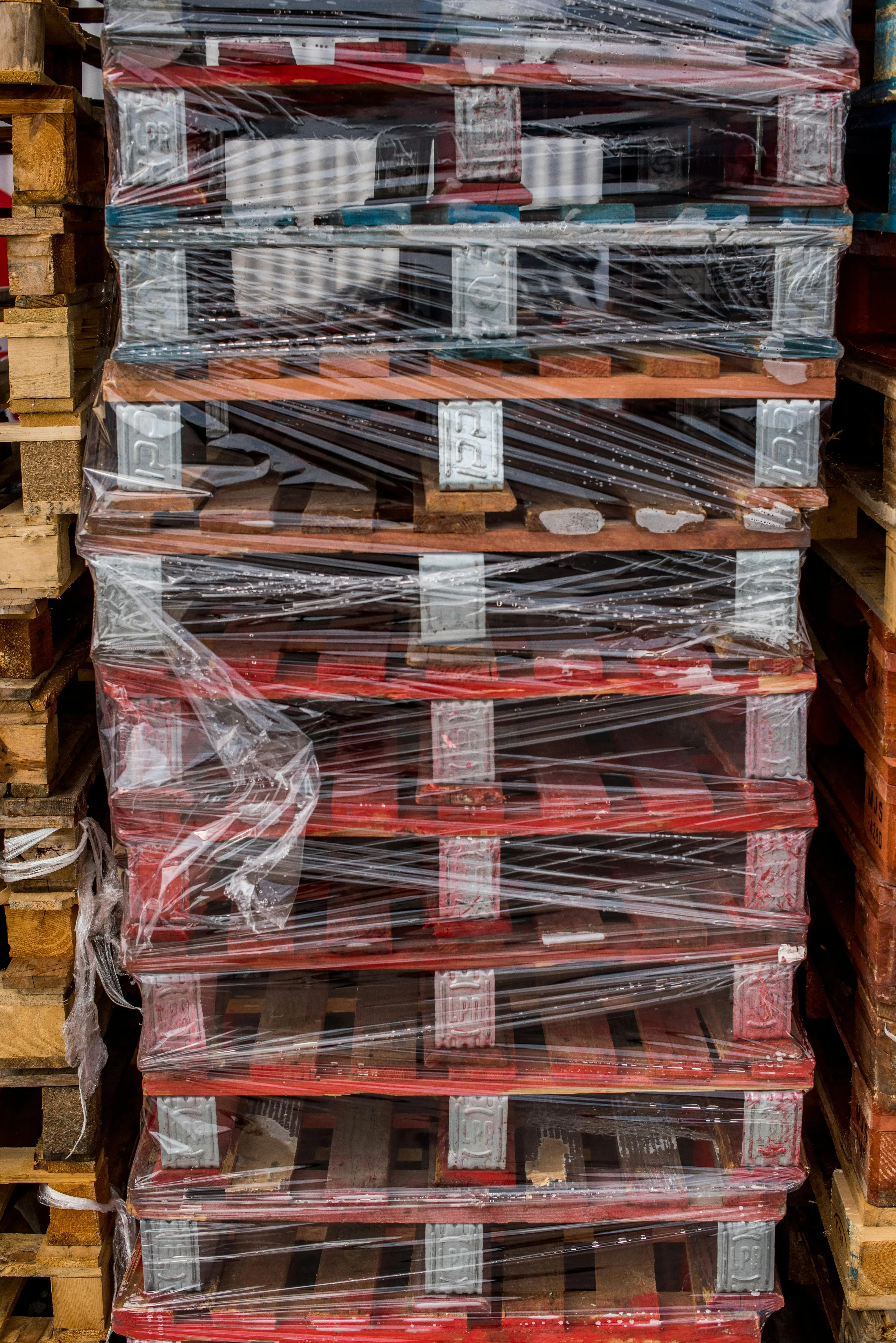Common Mistakes Businesses Make in Pallet Storage - Avoid These Errors
Struggling with inefficient pallet storage that's costing your South Florida business money and creating safety risks? Miami Container Trucking's professional pallet storage solutions eliminate common storage mistakes while providing secure, climate-controlled storage starting at just $19 per month. Our 155,000 square foot Fort Lauderdale facility near Port of Miami and Port Everglades offers expert storage management that prevents costly errors. Discover our Pallet Storage Services to see how proper storage practices can transform your warehouse operations.
Pallet storage mistakes cost South Florida businesses thousands of dollars annually through damaged inventory, safety incidents, and operational inefficiencies. Understanding and avoiding these common errors transforms chaotic storage systems into organized, cost-effective operations that maximize space utilization while protecting valuable inventory.
What Are the Most Costly Pallet Storage Mistakes Businesses Make?
Pallet storage mistakes range from simple oversights to systematic problems that compound over time, creating significant financial and operational challenges. For Miami-area businesses managing imports through Port of Miami and Port Everglades, these errors become particularly costly when they disrupt supply chain operations or damage valuable international cargo.
The most expensive mistakes typically involve overloading systems beyond capacity, ignoring quality standards, and failing to implement proper organization systems. These problems create cascading effects that impact warehouse safety, inventory accuracy, and operational efficiency. Miami Container Trucking's experience handling thousands of containers annually has revealed patterns in storage mistakes that businesses can easily avoid with proper planning and professional guidance.
Understanding these common pitfalls enables businesses to implement preventive measures before problems occur. Professional pallet storage facilities like our Fort Lauderdale warehouse demonstrate proper storage techniques that eliminate these mistakes while providing the infrastructure needed for safe, efficient operations.
How Does Overloading Pallets and Storage Systems Create Dangerous Situations?
Overloading represents the most dangerous and expensive pallet storage mistake, leading to structural failures, inventory damage, and serious safety incidents. Every pallet and storage system has specific weight limits that must be respected to maintain structural integrity and workplace safety.
Businesses often attempt to maximize storage density by exceeding weight limits, creating unstable conditions that can result in catastrophic failures. When pallets collapse or storage systems fail, the resulting damage extends beyond lost inventory to include potential worker injuries, facility damage, and business interruption costs. These incidents can cost tens of thousands of dollars and create liability issues that impact insurance rates and regulatory compliance.
Our warehouse facility utilizes heavy-duty systems designed to handle loads up to 80,000 lbs while maintaining strict weight distribution protocols. Our experienced team understands proper loading techniques that maximize storage capacity without compromising safety. Professional storage facilities implement weight monitoring and train personnel to recognize overloading risks before they create problems.
Weight distribution becomes particularly critical when storing mixed cargo types or handling containers with varying densities. Proper palletization services ensure that weight is distributed evenly across pallet surfaces, preventing stress concentrations that can cause failures during handling or storage.
What Problems Result from Poor Stacking and Organization Practices?
Poor stacking practices create multiple problems that impact both safety and operational efficiency in pallet storage operations. Stacking pallets improperly, creating excessively high stacks, or failing to maintain proper alignment leads to unstable configurations that can collapse without warning.
Improperly stacked pallets are particularly dangerous because they create top-heavy configurations that can topple over, causing injury to personnel and damage to nearby inventory. The proper horizontal stacking method provides stable foundations that can be safely accessed by forklifts and maintained over extended periods. Professional storage facilities implement height limits and stacking protocols that prevent these dangerous configurations.
Organization problems compound when businesses fail to implement systematic approaches to pallet placement and retrieval. Without proper labeling, location tracking, and inventory management systems, warehouses become chaotic environments where locating specific items requires extensive searching. This inefficiency increases labor costs while creating opportunities for handling damage.
Our warehouse management provides organized storage solutions that eliminate these problems through systematic pallet placement, clear labeling, and inventory tracking. Our facility design incorporates wide aisles, proper spacing, and designated zones that support safe stacking practices while maintaining easy access for material handling equipment.
How Do Quality Control Failures Lead to Expensive Storage Problems?
Ignoring pallet quality represents a critical mistake that creates ongoing safety and efficiency problems throughout storage operations. Damaged pallets with broken boards, protruding nails, or weakened joints compromise the stability of entire storage systems while creating safety hazards for personnel.
Many businesses continue using damaged pallets to avoid replacement costs, but this short-term thinking creates much larger expenses when failures occur during storage or handling. Damaged pallets can collapse under loads they should normally support, causing inventory damage and potential injuries. The cost of replacing damaged inventory typically exceeds pallet replacement costs by significant margins.
Regular pallet inspections enable early identification of damage before it creates problems. Professional storage operations implement systematic inspection schedules that catch wear patterns, structural damage, and contamination issues. Our palletization services include quality assessment and replacement recommendations that prevent damaged pallets from entering storage systems.
Climate-controlled storage environments help extend pallet lifespan by preventing moisture-related deterioration that weakens wooden pallets. Our warehouse includes dedicated climate-controlled zones that protect both pallets and stored products from South Florida's humidity and temperature fluctuations, reducing replacement frequency while maintaining structural integrity.
What Space Planning Mistakes Reduce Storage Efficiency?
Space planning mistakes waste valuable warehouse capacity while creating operational inefficiencies that increase handling costs. Choosing inappropriate storage configurations, creating narrow aisles, or failing to optimize vertical space utilization prevents businesses from maximizing their storage investments.
Undersized or oversized storage areas create wasted space and handling difficulties that reduce overall warehouse efficiency. When storage areas don't match pallet dimensions properly, space utilization suffers while loading and unloading become more difficult and time-consuming. Professional facility design considers pallet dimensions, handling equipment requirements, and operational workflows to optimize space utilization.
Aisle width mistakes represent another common planning error that impacts operational efficiency. Narrow aisles may seem to maximize storage density, but they create bottlenecks that slow material handling operations and increase accident risks. Proper aisle design balances storage density with operational efficiency, enabling safe forklift operations while maintaining reasonable material flow rates.
Our 155,000 square foot warehouse demonstrates optimal space planning through strategic layout design that maximizes storage capacity while maintaining efficient material handling workflows. Our facility includes 20 loading docks, wide aisles for forklift operations, and both organized storage areas that accommodate different cargo types and handling requirements.
How Do Climate Control Oversights Damage Stored Inventory?
Climate control mistakes create expensive inventory damage problems that many businesses discover only after significant losses occur. South Florida's high humidity and temperature fluctuations can cause rapid deterioration of products and packaging materials when proper environmental controls are not maintained.
Moisture-related damage affects both stored products and wooden pallets, creating conditions for mold growth, package deterioration, and structural weakening. Products ranging from electronics to textiles can be permanently damaged by humidity exposure, while food products may become unsaleable due to packaging degradation or contamination concerns.
Temperature fluctuations create additional problems for sensitive products that require stable environmental conditions. When storage areas lack proper climate control, products may experience thermal cycling that affects quality, performance, or shelf life. These problems become particularly costly when they affect entire pallet loads of imported goods.
Our warehouse facility includes dedicated climate-controlled zones with continuous monitoring systems that maintain optimal temperature and humidity levels.
Professional climate control systems also support regulatory compliance for industries with specific storage requirements, such as food and pharmaceutical products that must maintain proper environmental conditions throughout the storage period.
What Inventory Management Mistakes Create Operational Chaos?
Poor inventory management creates operational chaos that increases costs while reducing customer service quality. Failing to implement proper labeling systems, location tracking, or rotation protocols leads to inefficient operations where locating specific items requires extensive searching and handling.
First-In, First-Out inventory rotation becomes impossible without proper tracking systems, leading to product deterioration and waste. This problem becomes particularly expensive when handling perishable goods or items with expiration dates, where improper rotation can result in significant inventory losses.
Inadequate documentation and record-keeping compound inventory management problems by creating discrepancies between physical inventory and records. These inaccuracies lead to stockouts, overordering, and customer service problems that damage business relationships and increase operational costs.
Our team maintains accurate records and provides regular reporting that supports effective inventory control and planning.
Professional inventory management also includes regular counting and audit procedures that maintain accuracy while identifying potential problems before they impact operations. These systematic approaches ensure that stored inventory remains properly organized and readily accessible when needed.
How Do Safety Protocol Failures Create Liability Issues?
Safety protocol failures in pallet storage create significant liability exposures that can result in worker injuries, regulatory violations, and expensive legal consequences. Inadequate training, poor equipment maintenance, and failure to implement proper safety procedures create dangerous working conditions that violate safety standards.
Forklift operations in improperly organized storage areas increase accident risks through poor visibility, inadequate maneuvering space, and unstable load conditions. When safety protocols are not properly implemented and enforced, the likelihood of accidents increases significantly, creating workers' compensation claims and potential regulatory penalties.
Emergency preparedness failures compound safety risks by preventing effective response to incidents such as fires, chemical spills, or structural collapses. Professional storage facilities implement comprehensive emergency procedures, maintain proper safety equipment, and train personnel in emergency response protocols.
Our warehouse operations maintain strict safety protocols that include certified forklift operators, regular safety training, and comprehensive emergency procedures. Our facility includes proper lighting, marked walkways, and safety equipment that creates a secure working environment for both personnel and stored inventory.
Professional storage facilities also maintain comprehensive protection coverage that protects against various risks while demonstrating commitment to safety and regulatory compliance. This protection extends to customer inventory and provides peace of mind for businesses storing valuable goods.
What Communication Gaps Prevent Efficient Storage Operations?
Communication gaps prevent businesses from achieving efficient storage operations by creating coordination problems that increase errors and delays. Lack of clear communication between storage operations and customer requirements leads to misunderstandings about handling procedures, delivery schedules, and inventory priorities.
Manual communication processes create opportunities for errors in instructions, timing, and special handling requirements. These mistakes lead to incorrect handling, delayed shipments, and customer service problems that damage business relationships while increasing operational costs.
Information gaps between storage operations and broader business systems prevent visibility into inventory status and availability. Without proper communication channels, businesses cannot provide accurate information to customers or make informed decisions about inventory management and distribution planning.
Our warehousing services provide clear communication channels and regular updates that eliminate these gaps through dedicated account management and coordinated operations. Our team works closely with customers to understand requirements and provide consistent updates on inventory status and handling progress.
Professional communication also includes detailed documentation and reporting that provides transparency into all storage operations and enables informed decision-making for inventory planning and customer service.
Key Strategies for Avoiding Pallet Storage Mistakes
Successful pallet storage requires systematic approaches that address quality control, space planning, safety protocols, and operational management. Start by implementing comprehensive inspection procedures that identify and address potential problems before they create expensive failures or safety incidents.
Invest in proper infrastructure that supports safe, efficient storage operations. This includes appropriate storage systems, material handling equipment, and environmental controls that protect both products and personnel. Professional storage facilities provide these capabilities without requiring significant capital investments from individual businesses.
Choose professional storage partners that offer integrated services including container handling, palletization, and distribution coordination. Our comprehensive approach handles container pickup from port terminals, expert palletization, secure storage, and coordinated delivery under one roof. This integration eliminates handoffs between multiple service providers while ensuring consistent quality throughout the process.
Focus on scalability and flexibility when implementing storage solutions, as business growth and seasonal fluctuations can significantly change storage requirements. Professional storage agreements should allow adjustment of space and services without long-term commitments that may not match evolving business needs.
Consider location advantages when selecting storage providers, ensuring that facilities provide strategic access to ports and transportation networks. Our Fort Lauderdale location provides immediate access to both major South Florida ports while connecting to regional highway systems for efficient distribution.
Don't let common pallet storage mistakes cost your South Florida business money and create safety risks.
Miami Container Trucking's professional storage solutions eliminate these problems through expert handling, climate-controlled environments, and systematic organization.
Our pallet storage services start at just $19 per month in our secure 155,000 square foot Fort Lauderdale facility. Located strategically between Port of Miami and Port Everglades, our experienced team prevents costly storage mistakes while providing the infrastructure needed for efficient operations. With storage rates starting at $19 per month, MCT delivers the reliability and expertise your business needs to avoid expensive storage errors.
Contact our team today to discover how our professional pallet storage services can eliminate costly mistakes and improve your warehouse operations.
You May Also Like
These Related Stories

How Pallet Storage Improves Supply Chain Efficiency in South Florida

Seasonal Storage Challenges Solved by Pallet Storage in South Florida


